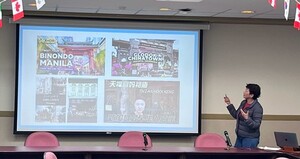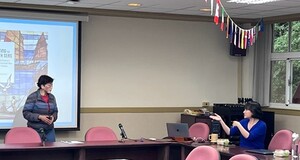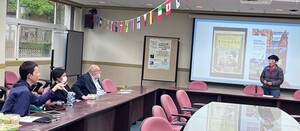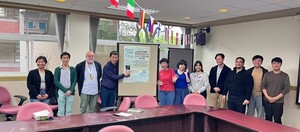Global South and Beyond: Interdisciplinary and Multicultural Collaboration Between Taiwan and Singapore
The College of Foreign Languages and Literature at National Chengchi University (NCCU) hosted its inaugural event of the MOE-sponsored project “Cultural Identity in a Global Perspective” on March 14, by inviting Professor Iping Liang, Distinguished Professor of the Department of English at National Taiwan Normal University (NTNU), to deliver a lecture titled “Global South and Beyond: Interdisciplinary and Multicultural Collaboration Between Taiwan and Singapore.” Professor Liang provided insights into Taiwan’s extensive exchanges and collaborations with Southeast Asian countries under the government’s Southbound Policy. Additionally, she also shared her own rich experiences in academic exchanges and interdisciplinary research with scholars from Singapore, Malaysia, the Philippines, Indonesia, and other countries.
The lecture began with a warm introduction to Professor Liang by Professor Li-hsin Hsu, Chair of the Department of English at NCCU. Professor Liang specializes in American literature, Asian American literature, Native American literature, and Southeast Asian Anglophone literature. She has also accumulated remarkable achievements in interdisciplinary and multicultural collaborations. Her recent research on plant narratives in Southeast Asian Anglophone literature is particularly outstanding. Notably, the edited volumed Critical Plant Studies in Taiwan, published in 2024, explores the historical context of vegetal ecocriticism in Taiwan and delves into profound issues concerning the entanglement between humans and plants.
Following Professor Hsu’s introduction, Professor Liang guided the audience through the historical context of the so-called “Global South.” She traced the development of Chinese cultural settlements in Southeast Asia, including the formation of Chinatown and the idea “Nanyang” (the Southern Seas). She also elaborated on the main aspects of Taiwan’s “Southbound Policy,” summarizing Taiwan’s economic, cultural, and educational exchanges with Southeast Asian countries. From her discussion, it became clear that Taiwan, as part of the Pacific Rim, has maintained frequent exchanges with Southeast Asia throughout history, leaving significant footprints in economic and cultural collaborations.
Furthermore, Professor Liang shared her experiences in multicultural collaboration in Singapore. She explained her academic encounter and exchange with Professor Angelia Poon from Nanyang Technological University (NTU). Through her extensive collection of photos, we saw her dedicated and immersive research journeys in the past two years. She also detailed her research exchange projects funded by the National Science and Technology Council (NSTC), which included participating in international conferences, conducting short-term overseas visits, editing special issues, organizing Singapore study groups, and taking a research trip to NTU, Singapore. Her efforts and enthusiasm for academic research were clearly impressing the audience.
During the final Q&A session, an audience member curiously asked how she had advanced her research to achieve such fruitful outcomes. Professor Liang replied that there was no special “secret technique”—it all started with just “one email exchange with a scholar,” and everything naturally fell into place from there. After the talk, Prof Liang further elaborated on the benefit of conducting inter-disciplinary research. She described the project as giving herself “a holiday break” from her disciplinary restrictions. Working with people from different fields, for Professor Liang, endows her with a sense of freedom and creates a more open academic environment.
In the end, Professor Liang expressed her fervent hope that her sharing could inspire and motivate everyone to create their own academic exchanges and, in particular, their own “global perspective.”







